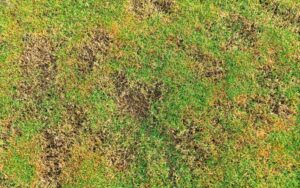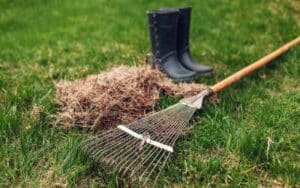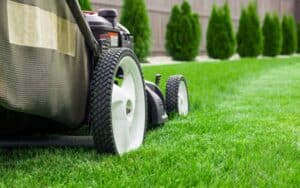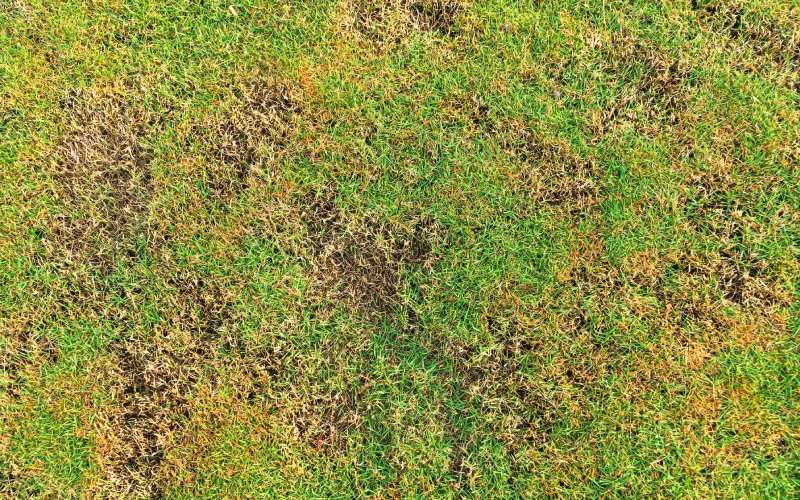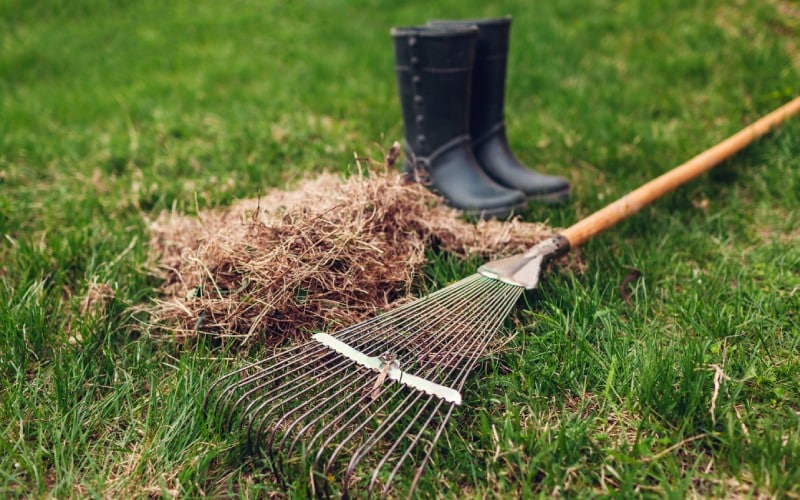Many Canadian homeowners take pride in how their lawn looks. A healthy, full green lawn can create a beautiful landscape and boost your home’s curb appeal, but at times it can be difficult to achieve. Maintaining a healthy lawn involves frequent maintenance several hours a week during the summer season.
While many people become deeply invested in their lawn care, others do not know how many times they should even mow their lawn. In this article, we will provide a comprehensive guide to lawn care. Readers can expect to be knowledgeable on fertilizer, water, mowing, weed prevention, and other maintenance needed to grow green grass.
Removing Debris During The Fall & Spring
Debris like sticks, rocks, leaves and other items can be detrimental to the health of your grass. When items rest on top of your lawn for a long period of time, it can suffocate the grass, cause disease and bar water and nutrients from reaching the grasses’ roots.
Most often, homeowners notice extra debris on their lawn during the early spring. Following a long winter and after thick layers of snow have melted, homeowners can find branches, stones, and fall leaves on the ground and on top of their lawn. We recommend that homeowners complete an annual spring cleanup to remove any debris from the ground. Removing this debris during the spring can help your lawn throughout the summer.
Feed Your Lawn Fertilizer
Water Your Lawn
Drought can frequently occur during the summer in Southern Ontario, causing your thick, healthy lawn to turn brown and patchy. Rather than letting a dead lawn ruin the appearance of your home landscape, water your turf 2 to 3 times a week during the early morning or late evening.

Weed Prevention
- Cost of your sod
- Delivery fees
- Unloading labour
- The labour to lay the sod
Ever since herbicide left the Canadian market in 2009, many homeowners have struggled to control weeds. These pesky and persistent plants regularly grow up between grass, ruining the pristine look of your lawn. Thankfully, there are ways to control weeds without using harsh chemicals.
A natural and homemade solution of salt, vinegar and dish soap is an effective weed prevention solution. Simply take a spray bottle and mix 1 gallon of white vinegar, 1 cup of salt and 1 tablespoon of vinegar. Use this spray to target a weed’s root without needing to worry about it killing your healthy grass.
The most reliable way of removing weeds from your lawn is to pull them by hand. While this is an effective method, it can be time-consuming and cause your back to ache from leaning over so frequently. Rather than pulling weeds by hand, buy a weeding tool like Fiskars Stand Up Weeder. This will allow you to pull weeds without getting a sore back.
Proper Lawn Mower Etiquette
One of the most important things you can do to take care of your lawn is to mow it frequently. While many homeowners typically mow their lawns when they believe it is too long, they actually need to mow it once a week to encourage new growth.
The mowing height is also an integral factor in lawn care. A lawn mower should be set anywhere between 3 inches to 3 and 1/2 inches above the ground. This will ensure that the mower only cuts the tips of the grass. After you finish cutting your grass and put your lawn mower away, remove any grass clippings on the lawn and compost them. Like other debris, clippings can suffocate your lawn if left for too long.
Pest Control
Much like weeds, insects can be an annoying issue that could negatively impact the health of your lawn. Bugs like grubs (beetle larvae), chinch bugs and sod webworms are pests that can destroy green grass.
Almost any insect/pests can be controlled using pesticides, a chemical spray that can repel, kill or control bugs. In order to find the right pesticide for your lawn, determine the culprit at hand. Here are some common signs of insects that can harm your lawn in Ontario:
- Chinch bugs give off a strong odour when they are crushed. If your lawn has a strong, repulsive odour after being walked on, you could have a large infestation. Spread the grasses to look for red nymphs or black adult chinch bugs. These bugs avoid the light and may hide in soil crevices.
- Grubs live under the surface of your soil and eat the roots of your grass. If you can easily pull your turf off of the soil, you may have grubs. Other signs are animals like raccoons and moiles digging holes in your lawn.
- Sod webworms can be identified by small moths flying over your lawn at dusk. Another way to tell if you have an infestation is to find the pre-emergent webworms resting on the blades of grass and turning their tips brown.

Dethatch & Aerate Soil
Much like your garden, lawns should be aerated to allow air and water to reach the grasses’ roots and encourage growth.
When you aerate your grass, cones of compacted soil are removed throughout your entire lawn. The holes allow nutrients like water and air to easily access the roots of the grass, resulting in increased root growth. Not only will aerating help create a healthier lawn, but it will also improve soil conditions. We recommend that you contact your local lawn care company to aerate your lawn as it requires a great deal of specialized equipment.
Another method of maintaining a healthy lawn is to thatch your lawn. A thatch layer is the cross-section of roots and soil. This layer can help save soil moisture and reduce heat fluctuations in turf. While this layer can be extremely beneficial to lawns’ health, it risks become harmful when it is over 1/2 inch thick because it can block air, water and nutrients from reaching the soil and plant. Rake or thatch your lawn to remove dead plant matter and allow your lawn to breathe.







